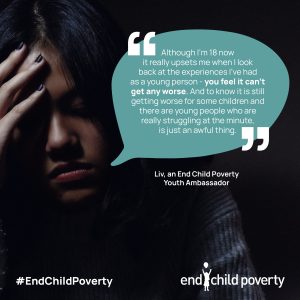An Anti-Poverty Strategy Cannot Wait
11 March 2024
By Becca Bor
Becca Bor, development coordinator at NIAPN, gave the following speech at Stormont on 4 March 2024 at the launch of the report, ‘Progressing an Anti-Poverty Strategy.‘ The event was co-hosted by Equality Coalition, Barnardo’s NI and NIAPN, and sponsored by Emma Sheeran MLA, Gerry Carroll MLA, Mike Nesbitt MLA, Sinéad McLaughlin MLA and Kate Nicholl MLA.
Thank you everyone for coming today. It is a testament to the hard work of many in this room and across the sector that have continued to amplify the voice, the needs and the realities of those living in poverty.
We need to keep a spotlight on poverty, continue to listen to those experiencing poverty – particularly those from marginalized groups who face many barriers in our society. We wanted to have this event today as a reminder that there is a duty of the Executive to implement an APS based on objective need: an anti-poverty strategy with measurable targets and aims, based on best practice and that it is evidence based.
It is a stain on our society that a single person lives in poverty, let alone 1 in 4 children. In 2024 it is completely unacceptable. And our collective efforts have to be geared towards the complete eradication of poverty.
At this juncture we do not have to reinvent the wheel. The report from the expert advisory panel and the co-design group lay out recommendations that are evidence based. Last June, at our event from which we are launching this report today, we were told a draft strategy was ready. However, this past Thursday, Permanent Secretary Colum Boyle, mentioned that he saw the draft strategy, but that it would be “some months away before it would be in shape to bring to the Executive.”
This strategy has to be the backbone for other policy initiatives -and we just can’t keep continuing to wait. An anti-poverty strategy needed to be a day one priority of the executive and we will continue to highlight the urgency of it.
The reality for so many, is that we have a social security system that is failing households. A low wage economy that is failing households. At the end of the day, people do not have enough money to afford the basics. The cost-of-living crisis has exacerbated the difficulties in making ends meet – but the cost of living crisis has occurred on the back of years of austerity that has already brought our public sector to its knees.
According to recent Joseph Rountree Foundation research, Destitution in the UK, 3.8 million people in 2022 lived in destitution. Around one million children. Almost two-and-a-half times the number of people living in destitution than in 2017, nearly triple the number of children. Nearly three-quarters of people experiencing destitution receive social security. 90% of those on Universal Credit are going without the essentials that they need. This past summer 54% of people on Universal Credit ran out of food & couldn’t afford more. We see this locally with statistics from Trussell Trust food banks and others.
One thing that is important to note is that if we look across the UK, the poverty rates here are actually lower than the most deprived areas in England. There are areas, particularly in the northeast of England that have child poverty rates of nearly 60%! Our poverty rates were not lower than parts of England 15 years ago, so, why is it the case now?
Quite simply, we have had policy divergences when it comes to Welfare Reform that have made a massive difference – or as we call them, welfare mitigations. The mitigation to the Bedroom Tax, the benefit cap until 2025, and providing supports for those moving from DLA to PIP have cushioned those on benefits from the harshest impacts of welfare reform. As the welfare mitigation review argued, we need to continue these mitigations – and expand them in order to protect the most vulnerable in society.
Most importantly, we must scrap the 2 -child limit to the child element of Universal Credit and find ways to close the 5 week wait for the first UC payment. There are over 45,000 children in households impacted by the 2-child policy – a figure that will only grow and will push more children into poverty. Additionally, as welfare claimants are now migrating over to UC en masse, we will see more and more households get into debt because of the 5 week wait and be unable to climb out of it.
An anti-poverty strategy has to look at the long term benefits of a society without poverty. I would argue that in order to do that, we need to follow the recommendations from the expert advisory panel, and look at how to invest in children. How to ensure that virtuous cycles are created that will have positive knock-on effects throughout a child’s life – from the beginning through adulthood. The evidence of early intervention is vast and indisputable.
Currently, children are actually hurt by the status quo – through the two-child limit; a lack of childcare strategy; a low wage economy that disproportionately impacts women on part-time hours (many of whom are mothers); woefully inadequate maternity and paternity leave; not to mention the budget of last year that was so harmful to children that the Children’s Law Centre felt that they had no choice but to seek a judicial review against the NIO and the Department of Finance arguing that they failed to conduct a cumulative equality impact assessment into the overall impact the budgetary provisions would have on children and young people.
Nearly 70,000 children in Northern Ireland are living in absolute poverty. 67% of children living in poverty are in working households. At last June’s event we heard harrowing experiences of mothers searching frantically for formula that they could afford to feed their babies. People sitting at home in the freezing cold – and families going to bed early, in layers and a hot water bottles, because they couldn’t afford the heat.
We need to start treating children as a public good, and understand that an investment in them, is an investment in all of society. Raising children out of poverty leads to higher educational attainment, better employment opportunities, better physical and mental health, in other words, it is not only unethical, but it is unaffordable to not lift our children out of poverty.
One intervention that is evidence based is a child payment. The data from Scotland has shown that already the child payment has decreased child poverty. The interim report of the Scottish payment (when it was £10 per child per week and not £25) showed evidence supporting: reduced money-related stress, increased child-related household spending, an increase in children able to participate in social and educational opportunities and a reduction of pressure on household finances. The findings on children’s opportunities and stress are key because we know that poverty limits educational and employment opportunities and persistent stress can have adverse impacts on long-term health.
Cash first interventions are evidence based. People need higher incomes, whether through wages or social security. This is why the recommendations include pieces on the Living Wages and collective bargaining, Welfare Mitigation, Child payment, upgrade of Carers allowance, to mention a few.
Interventions are needed to decrease expenses to raise living standards, such as a Childcare strategy, Free School Day, and support with rents and housing costs.
And there cannot be an effective strategy without it being based on the principles of inclusion with input, consultation, on-going review with people experiencing poverty.
An APS has to be an economic strategy that is integrated and financed through all Stormont departments. If we have any hope in creating a better future for our children, and by extension for all of us, we cannot wait any longer on an anti-poverty strategy.








